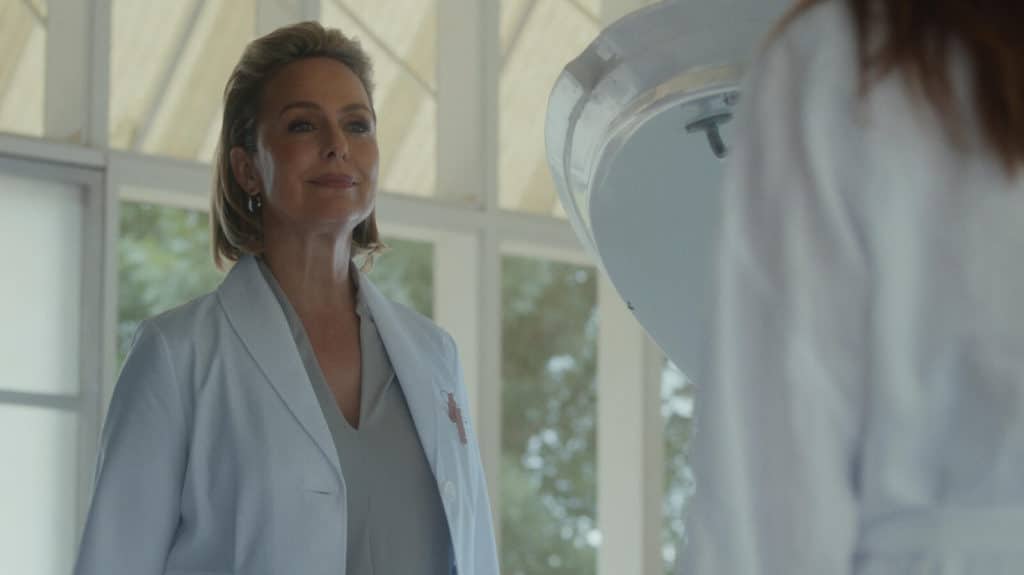
By Gabby Foor
Women are compared to many things, both complimentary and insulting. We can age like a fine wine, or spoil like milk; in this instance, we are a ticking clock. Alexis Jacknow’s Clock discusses a woman’s “biological clock” and the theory that, for women who don’t naturally desire children, that this clock has malfunctioned. Driven by the same anxiety-ridden, passive aggressive pressure that family, friends and doctors apply to women who desire independence over motherhood, Clock creates a paranoid psychological thriller that compares a woman’s longing to be childfree to an assault against nature severe enough that it could be considered not only the ultimate form of selfishness, but a form of mental illness. Filled with tension, this edgy internal conflict between fixing something that isn’t wrong to placate those you love and staying true to your own needs, treads some familiar but mostly fearful grounds.
Clock’s opening scene leaves little context before it dives into its story. An unknown woman stands on a swing-set, bleeding profusely. She wavers before climbing up onto the contraption, wrapping the chains around her neck and ending her life, a small, indistinguishable metal object falling to the ground into the pool of blood below. It’s a very dark entrance to what transitions into a very colorful, lively introduction to our characters. A baby shower, where even the snacks appear to have a color scheme, is where we find Ella (Dianna Agron) trying to enjoy the fare while listening to horror stories of mommies and mommies to be. Ella is an unlikely star of the show, designing the nursery for the mother to be but finding herself in the crosshairs: why hasn’t she had children yet? Why doesn’t she want kids? What does she do all day without kids? Ella isn’t taken by the imagery of pregnancy (tiny underdeveloped hands pushing through a stretched stomach? No thank you…) and a montage of a day in her admittedly productive and enviable life doesn’t suggest it has missing pieces. A child falling out of a tree suddenly and injuring themselves in the midst of Ella’s daydream only confirms the suspicion that Ella’s life is a dream compared to the parental nightmare.
Ella’s annual OBGYN appointment, due to fears of breast cancer, only meet her with more mommy talk as Dr. Webber (Nikita Patel), her husband’s colleague, suggests her biological clock is “broken” and that she is out of time to try for a family. Social media littered with children makes individual personal accomplishments feel hard to celebrate when everyone feels they aren’t meaningful without children. That night, at what starts as an energetic dinner with her father Joseph (Saul Rubinek) and husband Aiden (Jay Ali), Ella attempts to celebrate and entertain. By the time the food touches the table however, her father begins to discuss the empty chairs at the dinner table and how the story of family is “bigger than her.” Her family comes from a long line of Jewish heritage and a large amount of guilt has also been placed on Ella as the only child, and a daughter at that, who, to his despair, has not had children. “She’s the reason my heart aches,” her father says.
After one last bout with her husband is too much to take, Ella turns to a resource from her OBGYN: a clinical trial is being conducted about the female biological clock being treated as a “fertility problem.” She sacrifices an important lucrative job and leaves in secret to attend the trial. Clean, comforting neutral palettes make this look more like a day spa than a medical facility when Ella arrives, except for the stack of papers that indicate how much responsibility there will be, and tells us how much there may be hiding in the trial. Enter the all too calm to be trusted Dr. Elizabeth Simmons (Melora Hardin), an OBGYN with a background in the “cognitive issues” of fertility, whatever that means. Simmons believes this is fixable, as our purpose as humans is to procreate, and with hormones and cognitive behavioral therapy a woman’s clock can be reset: she can desire children.
As therapy and hormones begin, we start to see more clearly what’s tugging at Ella’s psyche and the theme of mental illness begins to play out in a sinister fashion. In one therapy session, a form of Rorschach is used and the images become quite lifelike. Ella sees in them a grandfather clock, a family of dead spiders and an eerie, tall woman. From this session, deep seeded fears and historical connections spring to life, and Ella’s history and relatable feelings of guilt and self-doubt start to make sense. Clock takes several turns throughout its second half that I wasn’t expecting and kept me on my toes of who to believe and whether or not I could trust my eyes or my heart with certain characters. Some outright spooky imagery is used as well as some simple use of implied brutality that gets the job done. I unfortunately can’t go deeper without revealing several twists you’ll have to discover for yourself.
With a charged performance by Agron leading the way, Clock is a bodily and psychologically unnerving look at the innerworkings of our “biological clocks” and by default our desires. A somewhat confusing and possibly divisive ending leads you to take a look at the film from start to finish and decide what’s actually come to pass, making Clock’s conclusion one to be pondered rather than immediately satisfying. This, neat, colorful piece of film is sometimes thoughtful and sometimes scary, but has taken a look at pregnancy and motherhood in a way I haven’t: something that can be forced through internal mechanisms and that a lack of desire can be classified as a medical disorder. Clock’s creepy approach is effective and anchored with strong performances and interesting, tricky imagery, and it’s enough to leave me shaken, like most maternal horror tales do. I guess by Clock’s reasoning I am disordered in my fears and desires, and after that watch, I will happily remain so.
Clock (2023) is available to watch now on Hulu, Disney+ and other streaming platforms.
